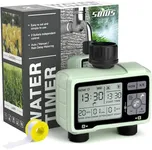Buying Guide for the Best Water Timers
Choosing the right water timer for your garden or lawn can make a significant difference in maintaining a healthy and lush landscape. A water timer automates the watering process, ensuring your plants get the right amount of water at the right time, even when you're not around. To pick the best water timer for your needs, consider the following key specifications and how they align with your specific requirements.Number of ZonesThe number of zones a water timer can control refers to how many separate areas or irrigation lines it can manage. This is important because different plants or sections of your garden may have varying water needs. Water timers typically range from single-zone to multi-zone models. Single-zone timers are suitable for small gardens or lawns with uniform watering needs. Multi-zone timers are ideal for larger gardens with diverse plant types or areas that require different watering schedules. Choose a timer with the appropriate number of zones based on the complexity and size of your garden.
Programming FlexibilityProgramming flexibility refers to how customizable the watering schedules are on the timer. This includes the ability to set specific days, times, and durations for watering. High flexibility allows you to tailor the watering schedule to the precise needs of your plants, which can be crucial for optimizing water usage and plant health. Basic timers may offer limited options, such as daily or every-other-day watering, while advanced models allow for more detailed programming, including multiple start times per day and different schedules for each zone. Consider your garden's watering requirements and choose a timer that offers the level of control you need.
Power SourceWater timers can be powered by batteries, solar energy, or a direct electrical connection. The power source is important because it affects the timer's reliability and maintenance needs. Battery-powered timers are easy to install and portable but require regular battery replacements. Solar-powered timers are eco-friendly and reduce the need for battery changes, but they need sufficient sunlight to function effectively. Electrically powered timers offer consistent performance but require a nearby power outlet and may involve more complex installation. Choose a power source that fits your garden setup and maintenance preferences.
Durability and Weather ResistanceDurability and weather resistance are crucial for a water timer, as it will be exposed to outdoor conditions. A durable timer made from high-quality materials will withstand the elements, including rain, sun, and temperature fluctuations, ensuring long-term reliability. Look for timers with weather-resistant features such as waterproof seals and UV-resistant housings. If you live in an area with harsh weather conditions, investing in a robust and weatherproof timer will save you from frequent replacements and ensure consistent performance.
Ease of UseEase of use refers to how user-friendly the water timer is, including the simplicity of its interface and the clarity of its instructions. A timer that is easy to set up and program will save you time and frustration. Look for models with intuitive controls, clear displays, and straightforward programming steps. Some timers also offer smartphone connectivity, allowing you to control and monitor your watering schedule remotely. If you're not tech-savvy, opt for a timer with basic, easy-to-understand features. If you prefer more control and convenience, consider a model with advanced, user-friendly technology.
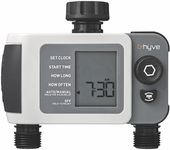
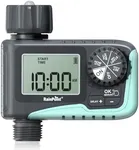
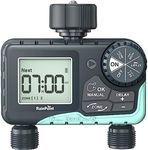
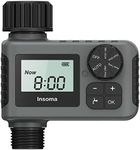
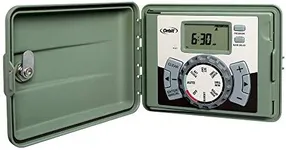
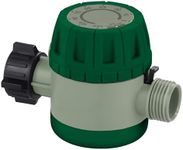
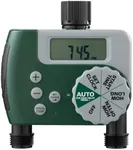
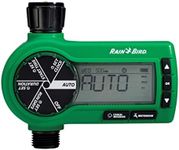
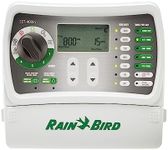

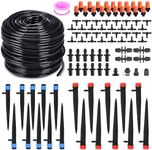

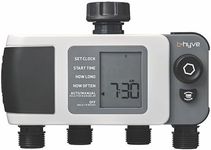

![LetPot Smart WiFi Water Timer for Garden Hose Faucet, [Solar-Powered 365Days Uninterrupted Power] Sprinkler Timer Outdoor Programmable,WiFi Hub & Type-C & 5W 6000mAh Portable Solar Panels, Brass Inlet](https://images-proxy.bestreviews.guide/b6_OwH_4mJuf0-jrWJ6c3w9x6BM=/0x150/https://m.media-amazon.com/images/I/41LTIozql2L._AC_CX679_.jpg)


